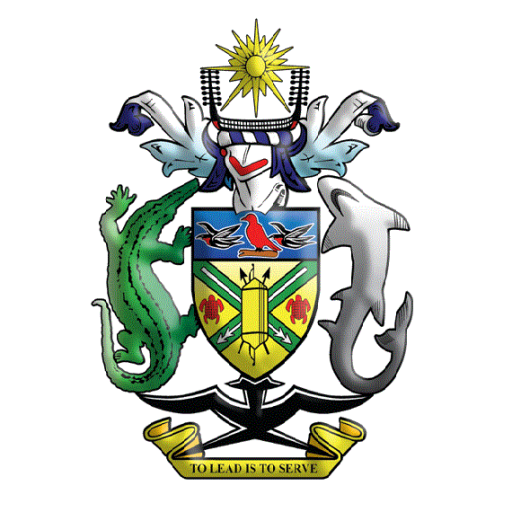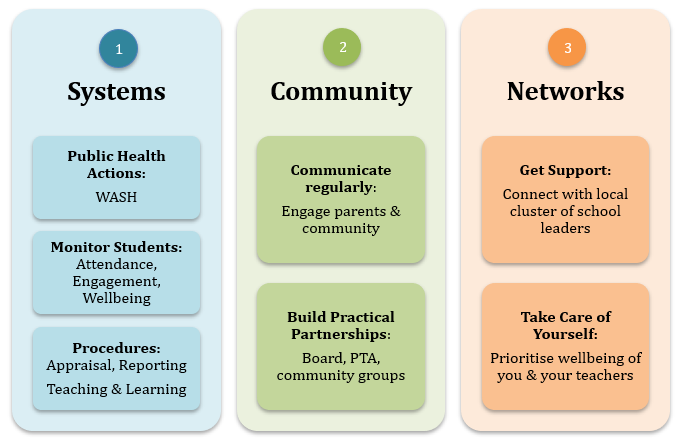School Leadership during COVID-19
In this important time, there are 3 key areas that we suggest you pay close attention to in your leadership for the remainder of 2020.
| Key Area | Key Actions |
|
Systems
|
· Implement WASH: Work with MEHRD, your EA, school board and community to improve WASH facilities. Give students clear advice about hand washing and other COVID-19 prevention action. Put up posters around the school. Use the booklet sent out by NDOC-Education about COVID-19 Prevention.
· Monitor Students: Gather and analyse information each week about student attendance, wellbeing and engagement in learning. Identify those students who are at most risk in their learning and health. Seek support, information or resources to help address these risks (see below).
· Reporting: make sure you complete reports that help you and the Board to operate the school in this time, including financial, attendance, health & safety and student achievement. See the attached School Improvement Plan to guide your planning for teaching and learning.
· Appraisal: complete appraisal for teachers on Probation and work with the EA to ensure School Leaders on Trial Promotion are appraised.
· Monitor Teaching: In addition, monitor the quality of teaching across your school (eg see attached guideline).
|
| Community
|
· Engagement: Communicate regularly with parents about what’s happening at school, especially changes arising from the COVID-19 responses. Let them know what’s different for their children. Share advice on how to stay healthy eg hand washing tips; how COVID-19 spreads. Ask them for their ideas.
· Partnerships: Work closely with your school board, PTA and community groups to support you with the new challenges arising in this time, and to help support the school’s readiness and activities. |
| Networks
|
· Professional: Use local school clusters and other networks to access support. It is important that you share ideas, questions and seek help for the new challenges you face. Some of the best support will come from other school leaders who are facing the same challenges at this time.
· Wellbeing: It is also important that you identify support for your wellbeing and how to help teachers with their wellbeing in a time of new challenges. Talk about the challenges being faced with your teachers and share ideas about how to support each other. |
Sources of Support
There are various places and people who can assist you with your planning and decision-making in relation to school operations, and teaching and learning. These include:
- Education Authority: contact your CEO or PEO for support with WASH, school planning, reporting and staff management
- MEHRD divisions can assist with specific advice, including, EA Coordination & Improvement Division; Teaching Services Division; Schools Division; Teaching & Learning Division. See MEHRD website for contact details – mehrd.gov.sb
- Provincial-based mentors – including LEAP project mentors; Provincial Literacy Trainers
- Solomon Islands iResource – a new site with information and resources for schools, teachers and students – iresource.gov.sb
- SIBC – weekly radio programs broadcast at 9am and repeated at 7.30 in the evening. Recorded audio podcasts of the radio broadcasts are available on iresource.gov.sb with supporting resources.
Attachments:
- Lesson Observations Guidelines
- School Readiness Planning (COVID-19 School Readiness plan issued by MEHRD)
- School Improvement Planning template example
Lesson Observations Guidelines
Lesson observations are one of the main ways a leader can make a judgement about the quality of teaching. Sometimes making time for lesson observations is very demanding for a leader. Finding an hour to set aside to be in a lesson is a challenge. It can therefore be helpful to plan shorter more focused observations.
For example:
- Plan for 15 minutes only to observe part of a lesson.
- Target one or two aspects of that teacher’s practice.
- This could be how they ask questions; how well they give instructions; how clearly they answer students’ questions; how they respond to student behaviour concerns.
- Focusing on one part of the lesson is another option – what happens at the start or end of a lesson; how settled and engaged is the class midway through a lesson?
- Shorter observations makes it more possible for leaders to complete more than one observation of a teacher during the year, and to build up a picture of their teaching over a period of time.
- Providing clear and specific feedback to the teacher following an observation is important. Talk with them about what you observed e.g. how well the teacher answers students’ questions; how they use assessment information to adapt their teaching.
- Keeping the feedback to one or two points helps the teacher hear and process the main message. Share with them something you observed that was going well and something you’d like them to think about for improving their teaching.
- Finally, it is important for a school leader to follow up with the teacher after a few weeks to find out how they have responded to that feedback.
Annual School Improvement Plan for Teaching & Learning
| School name:
School location: |
||||
| Area for Improvement | Activities | What will you need? | Who is responsible? | Progress & Next Steps |
| Improve:
Briefly state what needs to improve (eg assessment in Science).
Goals: Specifically what do you intend to do?
Timing: When will this be achieved?
|
Download this information as an editable Word Document: School Leaders in Emergency setting







